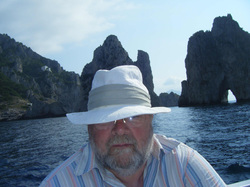- Home
- Site Index
- About Me
-
My Books
- Book List & Themes
- Strictly for Adults Novels >
-
Tales from Portlaw
>
- No Need to Look for Love
- 'The Love Quartet' >
-
The Priest's Calling Card
>
- Chapter One - The Irish Custom
- Chapter Two - Patrick Duffy's Family Background
- Chapter Three - Patrick Duffy Junior's Vocation to Priesthood
- Chapter Four - The first years of the priesthood
- Chapter Five - Father Patrick Duffy in Seattle
- Chapter Six - Father Patrick Duffy, Portlaw Priest
- Chapter Seven - Patrick Duffy Priest Power
- Chapter Eight - Patrick Duffy Groundless Gossip
- Chapter Nine - Monsignor Duffy of Portlaw
- Chapter Ten - The Portlaw Inheritance of Patrick Duffy
- Bigger and Better >
- The Oldest Woman in the World >
-
Sean and Sarah
>
- Chapter 1 - 'Return of the Prodigal Son'
- Chapter 2 - 'The early years of sweet innocence in Portlaw'
- Chapter 3 - 'The Separation'
- Chapter 4 - 'Separation and Betrayal'
- Chapter 5 - 'Portlaw to Manchester'
- Chapter 6 - 'Salford Choices'
- Chapter 7 - 'Life inside Prison'
- Chapter 8 - 'The Aylesbury Pilgrimage'
- Chapter 9 - Sean's interest in stone masonary'
- Chapter 10 - 'Sean's and Tony's Partnership'
- Chapter 11 - 'Return of the Prodigal Son'
- The Alternative Christmas Party >
-
The Life of Liam Lafferty
>
- Chapter One: ' Liam Lafferty is born'
- Chapter Two : 'The Baptism of Liam Lafferty'
- Chapter Three: 'The early years of Liam Lafferty'
- Chapter Four : Early Manhood
- Chapter Five : Ned's Secret Past
- Chapter Six : Courtship and Marriage
- Chapter Seven : Liam and Trish marry
- Chapter Eight : Farley meets Ned
- Chapter Nine : 'Ned comes clean to Farley'
- Chapter Ten : Tragedy hits the family
- Chapter Eleven : The future is brighter
-
The life and times of Joe Walsh
>
- Chapter One : 'The marriage of Margaret Mawd and Thomas Walsh’
- Chapter Two 'The birth of Joe Walsh'
- Chapter Three 'Marriage breakup and betrayal'
- Chapter Four: ' The Walsh family breakup'
- Chapter Five : ' Liverpool Lodgings'
- Chapter Six: ' Settled times are established and tested'
- Chapter Seven : 'Haworth is heaven is a place on earth'
- Chapter Eight: 'Coming out'
- Chapter Nine: Portlaw revenge
- Chapter Ten: ' The murder trial of Paddy Groggy'
- Chapter Eleven: 'New beginnings'
-
The Woman Who Hated Christmas
>
- Chapter One: 'The Christmas Enigma'
- Chapter Two: ' The Breakup of Beth's Family''
- Chapter Three: From Teenager to Adulthood.'
- Chapter Four: 'The Mills of West Yorkshire.'
- Chapter Five: 'Harrison Garner Showdown.'
- Chapter Six : 'The Christmas Dance'
- Chapter Seven : 'The ballot for Shop Steward.'
- Chapter Eight: ' Leaving the Mill'
- Chapter Ten: ' Beth buries her Ghosts'
- Chapter Eleven: Beth and Dermot start off married life in Galway.
- Chapter Twelve: The Twin Tragedy of Christmas, 1992.'
- Chapter Thirteen: 'The Christmas star returns'
- Chapter Fourteen: ' Beth's future in Portlaw'
-
The Last Dance
>
- Chapter One - ‘Nancy Swales becomes the Widow Swales’
- Chapter Two ‘The secret night life of Widow Swales’
- Chapter Three ‘Meeting Richard again’
- Chapter Four ‘Clancy’s Ballroom: March 1961’
- Chapter Five ‘The All Ireland Dancing Rounds’
- Chapter Six ‘James Mountford’
- Chapter Seven ‘The All Ireland Ballroom Latin American Dance Final.’
- Chapter Eight ‘The Final Arrives’
- Chapter Nine: 'Beth in Manchester.'
- 'Two Sisters' >
- Fourteen Days >
-
‘The Postman Always Knocks Twice’
>
- Author's Foreword
- Contents
- Chapter One
- Chapter Two
- Chapter Three
- Chapter Four
- Chapter Five
- Chapter Six
- Chapter Seven
- Chapter Eight
- Chapter Nine
- Chapter Ten
- Chapter Eleven
- Chapter Twelve
- Chapter Thirteen
- Chapter Fourteen
- Chapter Fifteen
- Chapter Sixteen
- Chapter Seventeen
- Chapter Eighteen
- Chapter Nineteen
- Chapter Twenty
- Chapter Twenty-One
- Chapter Twenty-Two
-
Celebrity Contacts
-
Thoughts and Musings
- Bereavement >
- Nature >
-
Bill's Personal Development
>
- What I'd like to be remembered for
- Second Chances
- Roots
- Holidays of Old
- Memorable Moments of Mine
- Cleckheaton Consecration
- Canadian Loves
- Mum's Wisdom
- 'Early life at my Grandparents'
- Family Holidays
- 'Mother /Child Bond'
- Childhood Pain
- The Death of Lady
- 'Soldiering On'
- 'Romantic Holidays'
- 'On the roof'
- Always wear clean shoes
- 'Family Tree'
- The importance of poise
- 'Growing up with grandparents'
- Love & Romance >
- Christian Thoughts, Acts and Words >
- My Wedding
- My Funeral
- Audio Downloads
- My Singing Videos
- Bill's Blog
- Contact Me
From Hell and Back to Haworth
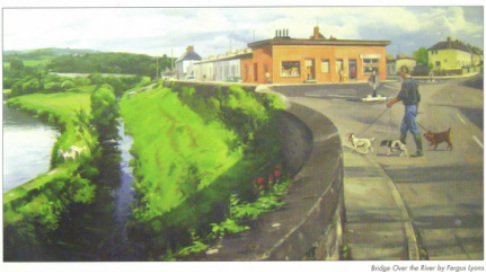
Image by Fergus Lyons
I was born in 14, William Street, Portlaw, County Waterford, Ireland, and was the eldest child of seven to a mother who was also the eldest child of seven. Like the Virgin Mary, my mother was informed two years prior to my birth that she would give birth to seven children and that her first born would be a 'special child.’ Her messenger however, was not the Archangel Gabriel, but a peg-selling gypsy who was happy to communicate this prophecy for the mere asking price of a silver six-penny piece.
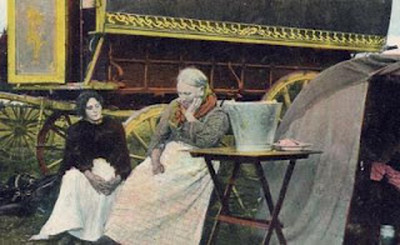
Thus my ‘specialness’ had been conferred upon me prior to me entering this world by a lady of gypsy origin and was reinforced every day thereafter by my mother as I happily developed. Anything unusual or good that came my way or emanated from my personal experience was because I was ‘special.’ In time, I came to willingly accept that I was indeed ‘special’ and destined for ‘special things.'
I spent the first thirty years of my life truly believing that I was ‘special’ and the past forty years learning that so is every other living person and creature!
I spent the first thirty years of my life truly believing that I was ‘special’ and the past forty years learning that so is every other living person and creature!
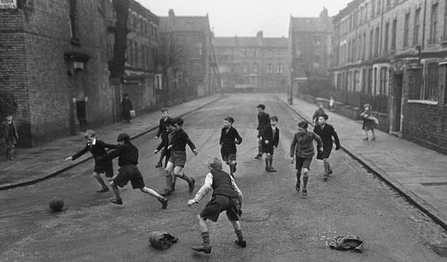
When I was a young boy aged eleven years, my dreams were no different to the dreams of any other boy on the estate where I lived. I wanted to play professional football for my country, Ireland, when I grew older. Unlike many a young dreamer of the fifties however, such dreams of mine could not accurately be described as ‘pipe dreams’ as they were founded on a shred of realism. For one thing, I possessed the pedigree of a budding footballer in the making. I could dribble a ball as good as any 11-year-old boy I knew, and I was the only boy under the age of fourteen years ever to play in the 'big boys' team at my school, 'St Patrick's Roman Catholic School' in Heckmondwike. Oh, and incidentally, my father played professional soccer for County Kilkenny before going on to play for his country in the Irish soccer squad in his twenties, so why shouldn't I?
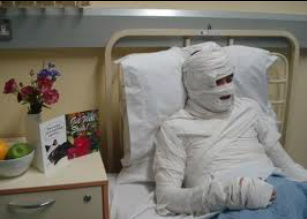
My football dreams of stardom were shattered at the age of eleven years when a large wagon ran over me and almost killed me. For ten weeks I remained critically ill; having incurred multiple injuries to my spine, stomach, chest and legs. Over the following ten weeks my parents were told a number of times that 'I'd die' and they prepared themselves for the loss of their eldest child. Later, when I eventually pulled through, they were told that 'I'd never walk again'. I remained in hospital for nine months, and had over fifty operations on my legs.

During the lengthy period that I was on the critical list, I received ‘The Last Sacraments’ many times and I can still recall drifting in and out of consciousness and seeing white-coated people in attendance at the end of my sick bed. I suppose that today such a vision would be called 'an out of body experience.' It doesn’t really matter why I didn’t die when the doctors and surgeons said I would. My father simply put it down to 'God’s intervention,’ whereas my mother simply chalked it up once again to my ‘specialness.’
The traffic accident had damaged my spine and had left me with no feeling or movement below the waist. At first, I remember being 'angry' at having had my football career stopped, even before it had started. Then I became 'fearful' of never being able to walk again, especially as I didn't possess the courage to live the remainder of my life from the deck of a wheelchair. Finally, I stopped 'loving' myself, and in time, I stopped expressing 'love' to other people.
The traffic accident had damaged my spine and had left me with no feeling or movement below the waist. At first, I remember being 'angry' at having had my football career stopped, even before it had started. Then I became 'fearful' of never being able to walk again, especially as I didn't possess the courage to live the remainder of my life from the deck of a wheelchair. Finally, I stopped 'loving' myself, and in time, I stopped expressing 'love' to other people.

After eighteen months and approximately fifty operations later on my legs (It was seemingly important that my legs were straightened out and looked normal even if I remained unable to move them), I decided to allow my characteristic of pragmatism its full reign. Often, when one receives news that they don’t want to hear, they either close their ears to the message or shoot the messenger. I elected to do the former.
When Western medicine informed me that I'd never walk again, I refused to believe it. I turned my young mind to the philosophy and disciplines of the East. Over the next three years, I became a disciple of any Eastern discipline that helped me to mediate my pain, regain my self-respect, develop my capacity to visualise, manage my anger states and reduce my fear levels to healthy and rational proportions.
When Western medicine informed me that I'd never walk again, I refused to believe it. I turned my young mind to the philosophy and disciplines of the East. Over the next three years, I became a disciple of any Eastern discipline that helped me to mediate my pain, regain my self-respect, develop my capacity to visualise, manage my anger states and reduce my fear levels to healthy and rational proportions.

I maintained the belief that I would someday walk again and I began to engage in deep meditational practices; along with imagination and sensory experience exercises, in the belief that the visual could stimulate the actual. For three years, I imagined myself walking. I imagined myself feeling pain below my waist where feeling no longer existed, and I imagined my spine sending out the signals to my brain and legs once more; instructing them 'to walk'. I was daily increasing my knowledge of how the brain interacts with the body and I was instructing my body accordingly. While I know that his sounds highly fanciful to western ears, I sustained this visual practice for a long time, always believing strongly that it would work, until it did work (or if not that, something else intervened).

I believed that the ‘Power of the Mind’ was infinitely greater than the ‘Power of the Body’. My own limited knowledge of the body’s physiology effectively told me that 'pain' was itself an indication that something was wrong in the body, but it was also the prime indicator that 'life was present.' To me therefore, pain below my waist and in my legs was good, because pain represented the 'return of life' to my legs. Eventually, the pain in my lower body returned and gradually, so did my mobility.
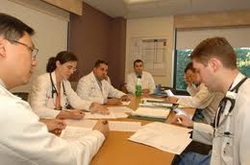
The national press described me as ‘a miracle’ which merely reinforced the degree of 'specialness' that my mother and I believed I truly possessed. For the next seven years, the then 'Batley and Dewsbury Hospital' (since demolished), annually displayed me as one of their miraculous guinea pigs to medical students and bodies of eminent surgeons. The return of my mobility was seemingly inexplicable. For my part, however, I simply accepted it as being no less than an ‘Act of God’ allied to my 'specialness', and the visualisation exercises I had carried out. I was determined to resume the many of life’s challenges ahead.
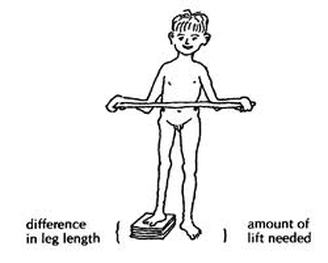
The innumerable operations on my legs had stunted my growth and left my left leg three-inches shorter than my right leg. I spent a further three to four years engaging in mental visualisation exercises and disciplines to minimise my limp. By imagining that I didn’t limp too badly when I walked, I managed to get through life without limpimg too obviously and thereby being perceived ‘a cripple.’ This mind over body control to minimise my limp worked excellently until the end of a day arrived, along with body fatigue. Whenever my mind and body became more exhausted, my capacity to minimise my limp would grow less as the ability to visualise a lesser limp grew fainter. This resulted in my degree of limp significantly deteriorating as I grew more exhausted.
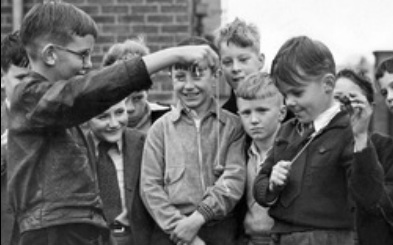
By the age of seventeen years, to the eyes of the outer world looking at me, I'd more or less been restored to a life of normality. However, my experiences had affected me to such an extent over those six years that I would never experience 'normality' within my age group again. During my three years of being unable to walk, I'd promised my Maker that if I did walk again, I would do some good with the remainder of my life. My Maker kept His promise, and from my late teens I have tried to keep mine. Ever since my teens, there has never been a time when I wasn't engaged in some voluntary or community work or raising awareness and money for charitable causes.
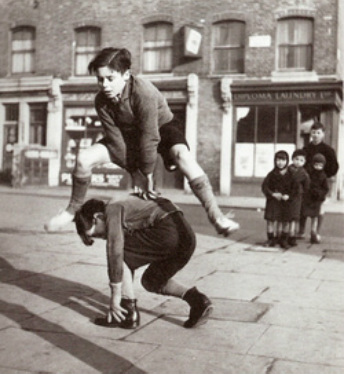
Furthermore, becoming totally immersed in Eastern disciplines as a young boy aged eleven, initially led me out of the comfort zone of my peer group and I found myself becoming more at home in the company of the older person. The bulk of my time was spent concentrating solely on self-improvement. I invariable felt more comfortable reading books on medicine, physiology, psychology and the mind, instead of engaging in some of the more physically active games. However, I did enjoy playing the more boistrous game of 'leap frog' with children of my own age in my early teens.
Even as an adult in later years, my research work and continued learning effectively ensured that I remained happy with my own company and was content to remain my own person without seeking or needing the approval of others. I fear that this trait of mine may have occasionally led others who didn't really know me, to mistake such self-certainty for 'arrogance.'
Even as an adult in later years, my research work and continued learning effectively ensured that I remained happy with my own company and was content to remain my own person without seeking or needing the approval of others. I fear that this trait of mine may have occasionally led others who didn't really know me, to mistake such self-certainty for 'arrogance.'
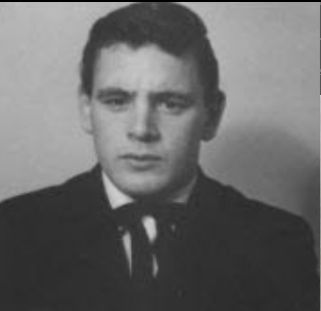
In spite of my intelligence (An I.Q OF 146), I couldn’t wait to enter the work force and earn some money by 16 years of age instead of taking my ‘O’ Levels. I became a textile vat operative and very early on became ‘politicised.’ By the age of eighteen years, I was in full flight of teenage invincibility. I was eager and ready to take on the world and face whatever life sent my way. At the age of 18 years old, I became the youngest textile Shop Steward in Great Britain, along with also being the youngest Youth Leader in England, and I turned down a scholarship to ‘Ruskin College’ that the trade union had secured for me. Instead I wanted to travel and at the age of 21 years, I spent a couple of years in Canada, during which I worked as a singer, a railway waiter, a washer up and an hotel receptionist.
The most significant experiences I had in Canada was to fall in love for the first time. I also discovered that although I was a good-enough singer, from which I could earn a modest living, I was far from being the 'world’s best singer' as I’d previously believed. My time in Canada also enabled me to meet a few famous people in the hotel where I worked for a year, such as film stars Dean Martin, Tom Ewell and Jack Lemon. I even sang a song with Dean Martin when he booked in around 2.00 am and I opened the restaurant to get him a sandwich. Over an hour we smoked, drank a few beers, talked and even sang a song together. see the enclosed regarding a fuller account of my meeting with Dean Martin. http://www.fordefables.co.uk/sweet-serendipity.html
Throughout my years 17 to 26, I discovered that the disciplines of judo, boxing, horse riding and Indian dance. These disciplines helped me tremendously to re-establish body balance.
The most significant experiences I had in Canada was to fall in love for the first time. I also discovered that although I was a good-enough singer, from which I could earn a modest living, I was far from being the 'world’s best singer' as I’d previously believed. My time in Canada also enabled me to meet a few famous people in the hotel where I worked for a year, such as film stars Dean Martin, Tom Ewell and Jack Lemon. I even sang a song with Dean Martin when he booked in around 2.00 am and I opened the restaurant to get him a sandwich. Over an hour we smoked, drank a few beers, talked and even sang a song together. see the enclosed regarding a fuller account of my meeting with Dean Martin. http://www.fordefables.co.uk/sweet-serendipity.html
Throughout my years 17 to 26, I discovered that the disciplines of judo, boxing, horse riding and Indian dance. These disciplines helped me tremendously to re-establish body balance.
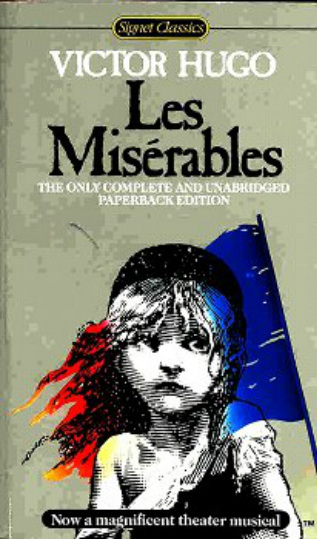
When I returned to England, I returned to the field of textiles and eventually became a Mill Manager. It was during this period that I married for the first time and six years later, my children James and Adam were born.
While I liked my Mill Manager's job, I knew that there was something lacking in my life. I eventually remembered that managing a mill, although profitable to my immediate family, was not fulfilling the promise I’d made to my Maker as a boy of 11 years of age. So I decided to do something I thought I’d be naturally good at; helping dishonest people. After all, it is said that it takes a thief to catch a thief, and prior to my childhood accident, I had learnt to steal with the best of them! I do recall the tremendous impact that Victor Hugo's book, 'Les Miserables' had on me when I first read it and it still remains high on my list of 'best reads.' I first read it as a 16-year-old, during the the quieter moments at the back of a greengrocer's shop I once worked in on Saturday mornings. I read it again when I was in Canada and then, when I became a Mill Manager, I found myself reading it again. The story has always seemed to haunt me.
By the age of thirty years, I'd become a Probation Officer in West Yorkshire and had started to discover just how inadequate in getting recidivists to change their behaviour I really was. It wasn't that what I'd been taught was meaningless, but rather that it wasn't applicable or amenable to the more entrenched type of offender who couldn't control their behaviour under certain circumstances.
I held this post for twenty-five years before taking early retirement on grounds of ill health and to pursue my writing career. Those twenty-five years I spent as a Probation Officer were the happiest and most rewarding of my entire working life. It was during those years that I was to re-link my past with my present in the most enlightening and beneficial of ways, and to do what I later came to believe was the thing that I was placed on this earth to do; to found 'Anger Management' and discover the process of changing previously involuntary behaviour and maintaing the changes long term.
While numerous people have worked with the behavioural problems of anger for many years, none had yet systematised a process; a best way of working with reinforced positive change sufficiently to make it long-term change once change occurred.
While I liked my Mill Manager's job, I knew that there was something lacking in my life. I eventually remembered that managing a mill, although profitable to my immediate family, was not fulfilling the promise I’d made to my Maker as a boy of 11 years of age. So I decided to do something I thought I’d be naturally good at; helping dishonest people. After all, it is said that it takes a thief to catch a thief, and prior to my childhood accident, I had learnt to steal with the best of them! I do recall the tremendous impact that Victor Hugo's book, 'Les Miserables' had on me when I first read it and it still remains high on my list of 'best reads.' I first read it as a 16-year-old, during the the quieter moments at the back of a greengrocer's shop I once worked in on Saturday mornings. I read it again when I was in Canada and then, when I became a Mill Manager, I found myself reading it again. The story has always seemed to haunt me.
By the age of thirty years, I'd become a Probation Officer in West Yorkshire and had started to discover just how inadequate in getting recidivists to change their behaviour I really was. It wasn't that what I'd been taught was meaningless, but rather that it wasn't applicable or amenable to the more entrenched type of offender who couldn't control their behaviour under certain circumstances.
I held this post for twenty-five years before taking early retirement on grounds of ill health and to pursue my writing career. Those twenty-five years I spent as a Probation Officer were the happiest and most rewarding of my entire working life. It was during those years that I was to re-link my past with my present in the most enlightening and beneficial of ways, and to do what I later came to believe was the thing that I was placed on this earth to do; to found 'Anger Management' and discover the process of changing previously involuntary behaviour and maintaing the changes long term.
While numerous people have worked with the behavioural problems of anger for many years, none had yet systematised a process; a best way of working with reinforced positive change sufficiently to make it long-term change once change occurred.
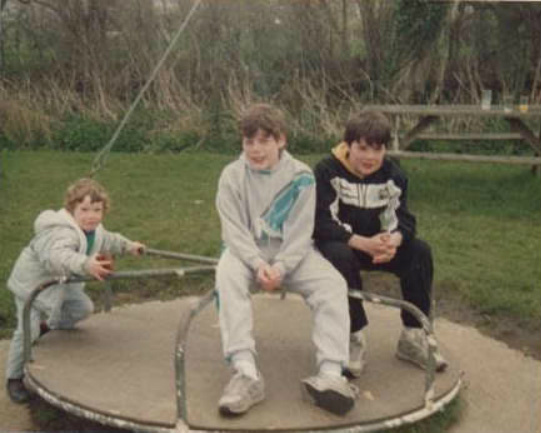
I would like to say that the discovery of the most successful way to teach people how to manage their anger came about through a ray of enlightenment, but the simple truth was, it didn’t. It was more like ‘a bump in the dark,’ where what one collided with wasn't to really show its face until the light was eventually switched on.
I hadn't been a Probation Officer for very long before I realised that the training we received as students didn't equip any of us to help some of the types of problem clientele that we were expected to engage with. It was true, that that for many offending clients, their offending behaviour had been within their control. Had they chosen to 'have done this' or 'not to have done that' they could have exercised their choice of what they eventually did or didn't do. Being wholly culpable in their criminal action, it became easier to accept that the punishment of this category of clientele was therefore invariably more deserving than those offenders who were unable to control their behaviour at the commission of their offence.
I hadn't been a Probation Officer for very long before I realised that the training we received as students didn't equip any of us to help some of the types of problem clientele that we were expected to engage with. It was true, that that for many offending clients, their offending behaviour had been within their control. Had they chosen to 'have done this' or 'not to have done that' they could have exercised their choice of what they eventually did or didn't do. Being wholly culpable in their criminal action, it became easier to accept that the punishment of this category of clientele was therefore invariably more deserving than those offenders who were unable to control their behaviour at the commission of their offence.

However, there were many offenders we were expected to work with who, at the precise time they offended, ‘were not in control of their action.’ Whether their offending behaviour was one of anger, theft or sexual impulse, these offenders were engaged in an 'involuntary action' or a 'learned response' which was automatically reproduced in given situations in a reaction to specific stimuli. This might lead a person who had constantly been the victim of violence in the home growing up, being unable to react in any other way than ‘a violent one’ in their future lives whenever faced with situations that are more likely to elicit an angry response. Such involuntary impulses could also result in an involuntary offence (which can be seen as ‘a cry for help’), such as a wealthy person of impeccable character who begins to shoplift and steal things they do not need, but who instead unconsciously wants to draw attention to their plight by being caught in the act.
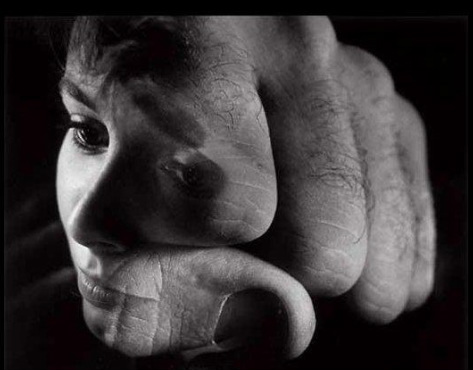
I decided there and then to abandon the traditional learning tools of my profession, and instead to construct a different type of work programme to offer clients, with the ultimate aim of changing their inappropriate behaviour that appeared to be beyond their control.
During my Probation career, I researched and analysed the response patterns of over 600 clients; both offenders and non-offenders. I also did a ten-year follow-up study on these clients. My eventual findings led me to discover that:
1. With most repeat offenders, their inappropriate offending behaviour pattern was largely ‘involuntarily operated’ (i.e., controlled by right-brain hemisphere).
2. They were rarely able to relax and always displayed ‘too much mental and physical body tension.’
3. The three most prominent emotions that governed their response patterns were ‘fear, anger and love.’ They displayed either too much fear or too much anger and there was never enough love expressed to self or others.
During my Probation career, I researched and analysed the response patterns of over 600 clients; both offenders and non-offenders. I also did a ten-year follow-up study on these clients. My eventual findings led me to discover that:
1. With most repeat offenders, their inappropriate offending behaviour pattern was largely ‘involuntarily operated’ (i.e., controlled by right-brain hemisphere).
2. They were rarely able to relax and always displayed ‘too much mental and physical body tension.’
3. The three most prominent emotions that governed their response patterns were ‘fear, anger and love.’ They displayed either too much fear or too much anger and there was never enough love expressed to self or others.
Whether the client with an 'involuntary response pattern' was an offender or a non-offender, their fear levels were either 'expressed' or 'repressed,' as were their anger levels. A person ‘expressing’ a high fear level' would always ‘repress their anger level,' whereas someone who ‘expressed a high anger level' would always ‘repress their fear level.' Neither Aggressive nor Non-Aggressive response pattern types were able to ‘express love’ for themselves or others. Consequently, they held a negative self-image and feelings of self-worth.

So, I developed group programmes which specifically taught them how to regain control of their behaviour pattern so that they could change it where and when required. This involved developing methods to access one's right-brain hemisphere and shift control of their problem behaviour patterns to the left-brain hemisphere. I believed that if one had control over one's own behaviour displayed, that in the main, one would not choose to display problematic, inappropriate and illegal behaviour.
I also needed to teach clients how to relax, as adopting the correct breathing pattern, body posture, muscle response and positive thought process, along with the ability to visualise were all vital prerequisites before right-brain functioning can be accessed. None of these prerquisites are obtainable without first learning how to deeply relax.
Finally, I then engaged clients in 26-weekly 2-hour-long programmes which showed them how to reduce fear and axiety levels, manage anger levels and learn how to love self and others once more. This work necessitated teaching clients with high fear levels to appropriately 'express their anger' and to teach clients with high anger levels to appropriately 'express their fears.' This programme of work was never considered by me to be complete until all response-pattern types were taught how to express their fears and anger states ‘appropriately’ while having regard to one's own personal rights and the rights of others.
I also needed to teach clients how to relax, as adopting the correct breathing pattern, body posture, muscle response and positive thought process, along with the ability to visualise were all vital prerequisites before right-brain functioning can be accessed. None of these prerquisites are obtainable without first learning how to deeply relax.
Finally, I then engaged clients in 26-weekly 2-hour-long programmes which showed them how to reduce fear and axiety levels, manage anger levels and learn how to love self and others once more. This work necessitated teaching clients with high fear levels to appropriately 'express their anger' and to teach clients with high anger levels to appropriately 'express their fears.' This programme of work was never considered by me to be complete until all response-pattern types were taught how to express their fears and anger states ‘appropriately’ while having regard to one's own personal rights and the rights of others.

Another unusual feature of these groups was their composition. Their membership (usually thirty people per group), were made up of repeated offenders, non-offenders who displayed problematic addictions to certain behaviour or substances such as medications, drugs and alcohol, professional workers wanting to learn about Relaxation methods, and clinical psychologists interested in 'Anger Management.' All group membership was confined to women, men and young people over 16 years old.
All group members were known to each other only by their first names and offences could only be raised by the group member themselves. Consequently, a person who had committed a serious offence might be found sitting alongside a mother who wanted to learn how to relax or alongside a Social Worker or medical practitioner who wanted to familiarise themselves with relaxation training methods or anger management techniques. And believe me, one would not always be able to tell who was likely to be from which category in the overall group!
All group members were known to each other only by their first names and offences could only be raised by the group member themselves. Consequently, a person who had committed a serious offence might be found sitting alongside a mother who wanted to learn how to relax or alongside a Social Worker or medical practitioner who wanted to familiarise themselves with relaxation training methods or anger management techniques. And believe me, one would not always be able to tell who was likely to be from which category in the overall group!

These programmes were the very first 'Anger Management' Programmes in Great Britain. Within a matter of three years, the process which I founded had mushroomed across the English-speaking world. This remains my proudest achievement to date; one that innumerable people have benefited from as a result of my presence on this earth. In later years, I began operating Relaxation procedures within primary schools and was surprised with the overall ease that children can be taught to relax. I have a theory that their capacity to use their imagination better than adults is significantly greater and helps them to relax with more ease.

For twenty five-years, I operated 'Anger Management' programmes in Probation Offices, Hostels, Hospitals, Churches and Chapels, Educational Establishments, Schools, Prisons, Psychiatric Wards and Community Halls.
I also introduced Relaxation programmes to ‘lifers’ in maximum security prisons, along with all the other venues in the previous paragraph. The successful outcome of my work provided me with national and international acclaim over the years that followed.
In 1990, a 10-year follow-up study on six hundred (600) group members showed that over 90% of my former offending clients had not received another criminal conviction (excluding motoring offences), after completion of their group programme membership. From those group members who had originally committed offences, one hundred and ten (110) of them had over one hundred (100) previous convictions each prior to group membership and the bulk of the other offending members had previous convictions in double figures prior to their group entry. At that time, the National Probation figures of non-offending rates two years after sentence was marginally less than 35%.
Paradoxically, once I had established the correct approach to use, I found it easier to help a person who had committed numerous involuntary offences to stop offending easier than an offender with fewer and more intentional offences.
From non-offending group members, over one hundred and twenty (120) women broke their addiction to anti-depressants and over fifty (50) alcoholics and drug addicts broke their addiction and stayed clean. One unexpected aspect that emerged within the lives of many group members was their marriage partner's inability to cope with their husband or wife's new behaviour. A number of marriages and relationships ended as a consequence of successful group membership and their marriage partner's inability to adapt to the changes which had taken place in their significant other! In truth, it is highly likely that such unsteady relationships would have ended anyway, but I cannot deny that some breakups were undoubtedly advanced in many situations because of the degree and rate of change in the response pattern of one person in the relationship.
I also introduced Relaxation programmes to ‘lifers’ in maximum security prisons, along with all the other venues in the previous paragraph. The successful outcome of my work provided me with national and international acclaim over the years that followed.
In 1990, a 10-year follow-up study on six hundred (600) group members showed that over 90% of my former offending clients had not received another criminal conviction (excluding motoring offences), after completion of their group programme membership. From those group members who had originally committed offences, one hundred and ten (110) of them had over one hundred (100) previous convictions each prior to group membership and the bulk of the other offending members had previous convictions in double figures prior to their group entry. At that time, the National Probation figures of non-offending rates two years after sentence was marginally less than 35%.
Paradoxically, once I had established the correct approach to use, I found it easier to help a person who had committed numerous involuntary offences to stop offending easier than an offender with fewer and more intentional offences.
From non-offending group members, over one hundred and twenty (120) women broke their addiction to anti-depressants and over fifty (50) alcoholics and drug addicts broke their addiction and stayed clean. One unexpected aspect that emerged within the lives of many group members was their marriage partner's inability to cope with their husband or wife's new behaviour. A number of marriages and relationships ended as a consequence of successful group membership and their marriage partner's inability to adapt to the changes which had taken place in their significant other! In truth, it is highly likely that such unsteady relationships would have ended anyway, but I cannot deny that some breakups were undoubtedly advanced in many situations because of the degree and rate of change in the response pattern of one person in the relationship.
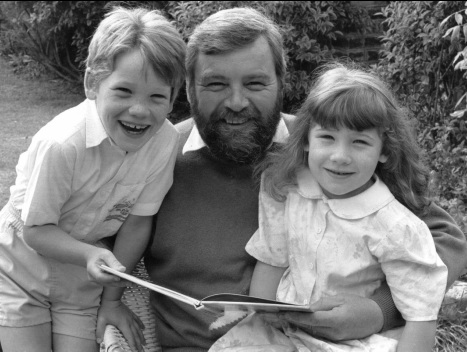
By 1971, my first marriage had ended and I subsequently remarried and fathered two more children, William and Rebecca who were born in 1983 and 1985. By 1989 I had my first children's book published and I gradually became more involved with young children and started visiting their schools to hold story-telling assemblies. My prominence as a children's writer was undoubtedly given a further boost when the later Princess Diana contacted me and asked me to send her two of my books to read to her then 9 and 7-year-old sons, Princesses William and Harry at bedtime. It is nice for a writer to know that their book was once read to by a future King of England by their mother at bedtime.
When I retired early in 1995, I concentrated upon my writing and used my stories as an ideal opportunity of introducing children to the principles of 'Anger Management' through themes and emotions explored in my books. All my storybooks deal with themes and emotions that the young person finds extremely difficult to express; such as fear, anger, bereavement, loss, separation, jealousy, bullying, racism, sexism, etc. I am sure that is why they were so popular with schools that Yorkshire schools became my sole selling venue with any additional unsold books going to other public organisations.
When I retired early in 1995, I concentrated upon my writing and used my stories as an ideal opportunity of introducing children to the principles of 'Anger Management' through themes and emotions explored in my books. All my storybooks deal with themes and emotions that the young person finds extremely difficult to express; such as fear, anger, bereavement, loss, separation, jealousy, bullying, racism, sexism, etc. I am sure that is why they were so popular with schools that Yorkshire schools became my sole selling venue with any additional unsold books going to other public organisations.
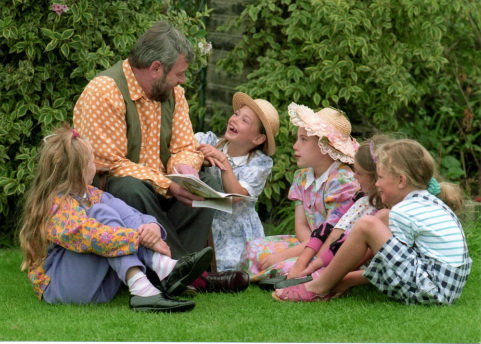
Very early on in my writing career, I'd decided to reinforce my messages to children by holding story-telling assemblies in their schools. I wanted to make the children feel 'special' and to experience that sense of specialness which I'd grown up with. So I chose to do this by having a famous person visit their school with me and to read from my book; someone whom they may have seen in a film, on the television, on the stage, on the football field playing for England, in a national newspaper or whose book they may had read.
Between 1990 and 2005, I visited over 2,000 Yorkshire schools and brought over 850 celebrity readers with me from the realms of royalty, church, politics, film, television, screen, stage, sport, the fields of art, literature and even antartic exploration etc. I have had sixty-six books published and one musical play between 1990 and 2014 and have allowed all £200,000 (Two hundred thousand pounds) profit from their sales to be given to charitable causes.
When I met and married Sheila in November, 2012, she encouraged me to start writing again after I'd 'hung up my pen' and also arranged for all of my previous books and stories to be published in E-book format and hard copy. I now have sixty-six published books in both e-book format and hard copy. Like all previous book-sale-revenue of mine, I give entirely to charity and charitable causes in perpetuity.
Originally, I wrote stories for children of primary school reading age (7-11 years). Then, I wrote stories to satisfy a 'cross-over readership' for young persons and adults (13-90 years). All of my new stories since 2010 however are short stories for adult readership and can be found under the title , 'Tales from Portlaw.' These thirteen latest and sometimes 'saucy' stories of mine are freely available to read on my website and are also available in e-book and hard copy publication.
In addition, my website also has an audio section containing around a dozen professionally read stories that are suitable for listeners only and which are freely available. These stories were originally recorded for radio transmission during the 1990s. Some of these stories are read by Brigit Forsyth, Thelma of 'The Likely Lads' television fame.
Between 1990 and 2005, I visited over 2,000 Yorkshire schools and brought over 850 celebrity readers with me from the realms of royalty, church, politics, film, television, screen, stage, sport, the fields of art, literature and even antartic exploration etc. I have had sixty-six books published and one musical play between 1990 and 2014 and have allowed all £200,000 (Two hundred thousand pounds) profit from their sales to be given to charitable causes.
When I met and married Sheila in November, 2012, she encouraged me to start writing again after I'd 'hung up my pen' and also arranged for all of my previous books and stories to be published in E-book format and hard copy. I now have sixty-six published books in both e-book format and hard copy. Like all previous book-sale-revenue of mine, I give entirely to charity and charitable causes in perpetuity.
Originally, I wrote stories for children of primary school reading age (7-11 years). Then, I wrote stories to satisfy a 'cross-over readership' for young persons and adults (13-90 years). All of my new stories since 2010 however are short stories for adult readership and can be found under the title , 'Tales from Portlaw.' These thirteen latest and sometimes 'saucy' stories of mine are freely available to read on my website and are also available in e-book and hard copy publication.
In addition, my website also has an audio section containing around a dozen professionally read stories that are suitable for listeners only and which are freely available. These stories were originally recorded for radio transmission during the 1990s. Some of these stories are read by Brigit Forsyth, Thelma of 'The Likely Lads' television fame.
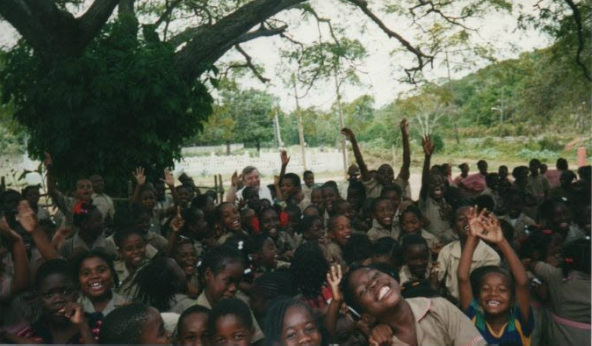
Between 2000 and 2002, I worked in liaison with the Jamaican Minister for Education, Youth and Culture by putting thirty-two Yorkshire schools into pen-pal relationship with all of the thirty-two schools in Falmouth, Jamaica, in a bid to help improve a better understanding between children of different race and nationality. In addition, I had two published books funded so that the many thousands of copies that were shipped out to Jamaica were able to raise over £20,000 for their much under-resourced schools ( 'One Love- One Heart' and 'The Kilkenny Cat').
My works have received the praise and support of many famous people over the years; the most notable being Nelson Mandela, who phoned me and praised two of my African stories as 'wonderful', the late Princess Diana who used to read my published works 'Douglas the Dragon' and 'Sleezy the Fox' to the young Princes William and Harry then aged 9 and 7 years, and former Chief Inspector of Schools for OFSTED, Chris Woodhead who described my writing to the press as being 'high quality literature.' The late Dame Catherine Cookson and her husband Tom liked my 'Action Annie' stories so much that they funded a 500-limited edition of the omnibus of twelve seasonal stories for 5-9 year olds, with all proceeds from book sales going to Mencap.
My works have received the praise and support of many famous people over the years; the most notable being Nelson Mandela, who phoned me and praised two of my African stories as 'wonderful', the late Princess Diana who used to read my published works 'Douglas the Dragon' and 'Sleezy the Fox' to the young Princes William and Harry then aged 9 and 7 years, and former Chief Inspector of Schools for OFSTED, Chris Woodhead who described my writing to the press as being 'high quality literature.' The late Dame Catherine Cookson and her husband Tom liked my 'Action Annie' stories so much that they funded a 500-limited edition of the omnibus of twelve seasonal stories for 5-9 year olds, with all proceeds from book sales going to Mencap.
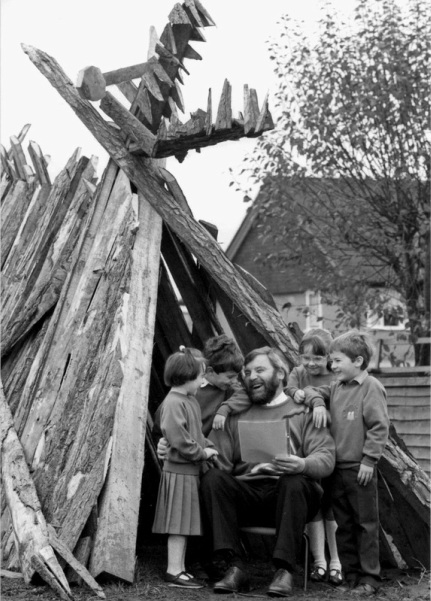
Other notable people who have read my books in school assemblies have included, The Earl and Countess of Harewood on four occasions, Norman Wisdom, Michael Parkinson, Norma Major, Dame Diana Rigg, Dame Vera Lynne, Dora Bryan, Jeffrey Archer, Timothy West, Prunella Scales, Christopher Timothy, Stan Barstow, Richard Whitely, Judge James Pickles, Rosemary Leach, Anita Roddick, Ashley Jackson, Brian Glover, Gordon Kaye, Chris Woodhead, Geoffrey Smith and even Sooty, etc.
Many famous readers who read in Yorkshire school assemblies at my request often did so two, three or four times over ten years. Sadly, many former famous readers who graced our Yorkshire schools with their presence between 1990 and 2000 have since died. May their souls rest in peace. I brought hundreds of famous faces into Kirklees schools between 1990 to 2000 to read from my books to thousands of school assemblies. During earlier years, special school reading assemblies would be held daily and during the latter five years after my reirement from the Probation Service, we would often have school readings twice daily!
Around the turn of the New Millennium, I began to question the worth of using celebrities to read my stories to assemblies of school children instead of me. Whereas initially the publicity that the celebrities attracted was vital to the promotion of my works, I eventually came to question why I was doing it. I began to appreciate more that having written the stories, I could deliver them to the children better than anyone else. Also, the children in the schools knew of me now, having been a regular annual visitor to their school for over ten years, whereas most children had never even heard of many of the celebrities who read to them, except through their parents and teachers. Telling my own stories enabled me to dramatise them in a way that the children could enjoy more and it enabled me to elicit from them the many messages that it is so crucial for growing children to become constantly aware of and acquainted with.
Towards he New Millennium, because of my global contribution to the introduction and spread of 'Anger Management' the National Lottery funded my presentation of an anger management musical play, called 'Douglas the Dragon Musical Play' based upon my four highly popular 'Douglas Dragon' books. A play was professionally produced and an 'Anger Management' packet with play script, six original songs, musical backing tracks, and guidelines was freely given to one thousand Yorkshire schools and Drama and Musical organisations and societies. Also, the same information was made free globally through my website. Now it was possible for any organisation of members between seven and seventy to perform this musical play. Primary schools could modify the text and they could sing along to the backing track or even mime to the solo numbers according to their age and ability, whereas adult or mixed groups of adults and different aged children could either use the backing tracks and sing and play their own versions of the play's songs, dependent on their musical ability. Hundreds, perhaps even thousands of schools globally have performed this musical play.
Many famous readers who read in Yorkshire school assemblies at my request often did so two, three or four times over ten years. Sadly, many former famous readers who graced our Yorkshire schools with their presence between 1990 and 2000 have since died. May their souls rest in peace. I brought hundreds of famous faces into Kirklees schools between 1990 to 2000 to read from my books to thousands of school assemblies. During earlier years, special school reading assemblies would be held daily and during the latter five years after my reirement from the Probation Service, we would often have school readings twice daily!
Around the turn of the New Millennium, I began to question the worth of using celebrities to read my stories to assemblies of school children instead of me. Whereas initially the publicity that the celebrities attracted was vital to the promotion of my works, I eventually came to question why I was doing it. I began to appreciate more that having written the stories, I could deliver them to the children better than anyone else. Also, the children in the schools knew of me now, having been a regular annual visitor to their school for over ten years, whereas most children had never even heard of many of the celebrities who read to them, except through their parents and teachers. Telling my own stories enabled me to dramatise them in a way that the children could enjoy more and it enabled me to elicit from them the many messages that it is so crucial for growing children to become constantly aware of and acquainted with.
Towards he New Millennium, because of my global contribution to the introduction and spread of 'Anger Management' the National Lottery funded my presentation of an anger management musical play, called 'Douglas the Dragon Musical Play' based upon my four highly popular 'Douglas Dragon' books. A play was professionally produced and an 'Anger Management' packet with play script, six original songs, musical backing tracks, and guidelines was freely given to one thousand Yorkshire schools and Drama and Musical organisations and societies. Also, the same information was made free globally through my website. Now it was possible for any organisation of members between seven and seventy to perform this musical play. Primary schools could modify the text and they could sing along to the backing track or even mime to the solo numbers according to their age and ability, whereas adult or mixed groups of adults and different aged children could either use the backing tracks and sing and play their own versions of the play's songs, dependent on their musical ability. Hundreds, perhaps even thousands of schools globally have performed this musical play.
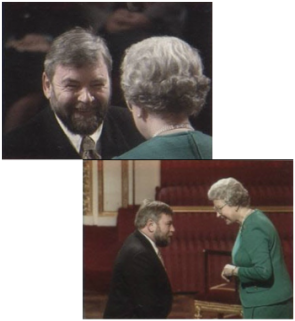
I have been very fortunate to have met so many many celebrities over my life span and being given a medal at Buckingham Palace by Queen Elizabeth in the early 1990s was certainly a highlight that I won't forget so easily. I have also spoken with the late Princess Margaret on the phone, the late Princess Diana and the Princess Royal, Princess Anne agreed to open a disabled centre for me in Dewsbury during the 1990s.
More important than meeting the queen, however, has been coming into contact with thousands of everyday people who support charitable causes across the land seven days a week. I always made a point of including in my line of celebrities from time to time the Lollipop person who I made sure read part of an assembly alongside some famous actor or other star or some elderly citizen who served this country during the Second World War and who too often feels unappreciated and undervalued.
More important than meeting the queen, however, has been coming into contact with thousands of everyday people who support charitable causes across the land seven days a week. I always made a point of including in my line of celebrities from time to time the Lollipop person who I made sure read part of an assembly alongside some famous actor or other star or some elderly citizen who served this country during the Second World War and who too often feels unappreciated and undervalued.
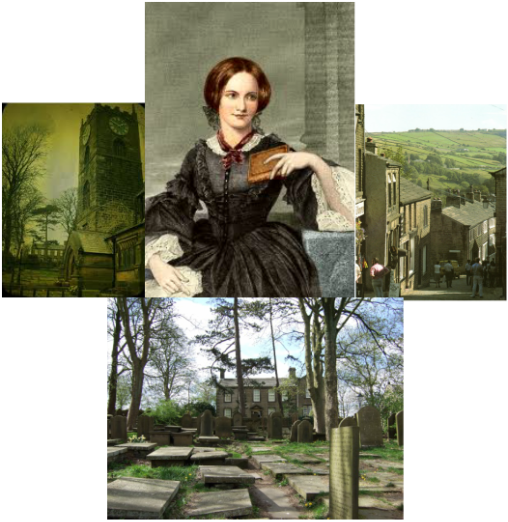
In 2011 I came to live in Haworth and when I look out of the window each morning, I can see the very home where one of my favourite writers, Charlotte Bronte and her family once lived. I intend to enjoy the remainder of my years in the beautiful village and countryside of Haworth.
When I stroll through the grounds of 'St.Michael and All Angels Parish Church' where Patrick Bronte preached and see the old gravestones located but yards from the small school room where Anne Bronte once taught and the Parsonage that the Bronte family lived in, it is like stepping back in a time warp. Even the cobbled stepping stones down the Main Street and the quaintness of the old, terraced properties that line the most popular of tourist walks throughout the year, leaves the walker with the feeling that it is no different today walking this road than it might have been two hundred years earlier.
Haworth has become my veritable 'Brigadoon' of West Yorkshire. Along with Portlaw where I was born, the two will always retain a special place in my heart.
When I stroll through the grounds of 'St.Michael and All Angels Parish Church' where Patrick Bronte preached and see the old gravestones located but yards from the small school room where Anne Bronte once taught and the Parsonage that the Bronte family lived in, it is like stepping back in a time warp. Even the cobbled stepping stones down the Main Street and the quaintness of the old, terraced properties that line the most popular of tourist walks throughout the year, leaves the walker with the feeling that it is no different today walking this road than it might have been two hundred years earlier.
Haworth has become my veritable 'Brigadoon' of West Yorkshire. Along with Portlaw where I was born, the two will always retain a special place in my heart.
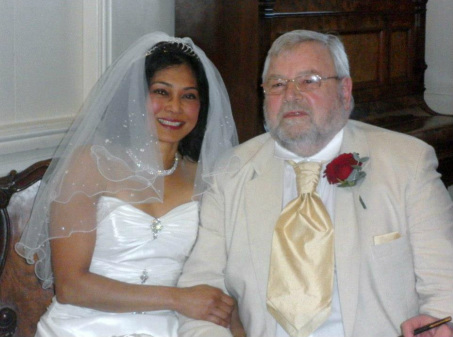
Some might view the journey of my life to press as having been to ‘Hell and back’ before settling in the heaven of Haworth. As one of my Australian friends might say, “Why waste time looking anywhere else when you’ve found the ‘Sheila’ you want to be with here in Haworth?”
On my 70th birthday, the 10th, November 2012, me and Sheila married in the church across the road. In my 71st year, I discovered that I had Chronic Lymphatic Leukemia; a terminal blood cancer. While events in time scale are no longer possible to predict, I can say without a shadow of doubt that since I married Sheila, I have never been happier in my life. I've also discovered that not only is Sheila my perfect partner, she is simply the very best cook I have ever known. So, it looks like Haworth is heaven is a place on earth.
Update: Since 2014, I developed another two cancers , making three in total. Two cancers have been treated, but have since returned, and my terminal cancer still remains, ready to suddenly ressurect itself at a future date. My present cancer renders me without any effective immune system and this means that literally shaking hands with another person or being within breathing proximity of them if they have the slightest cold, bug or the start of any infection is like me playing Russian Roulette with my life and can prove fatal for me.
For example, I have twice nearly died in hospital following the development of a new cancer or with a lung infection. During 2014, I spent over six months confined to bed and the house with pneumonia after someone with a cold came into my presence. This identical experience was repeated in 2015 and 2016 and between six months and ten months I was confined to the house and tld to avoid meeting more than two people at once; and only then after assuring myself they had no bugs or infections. The trouble is they can have an infection starting without knowing it. Paradoxically, the most dangerous person for me to be in contact with today are the ones I love being with the most; children. Contracting infections for them is both natural and desirable to build up their immunisation system; what I don't have and which threatens my life more daily than any other social interaction.
My present purpose in life is through my daily 'Thought for today' on Facebook. There are so many people with severe illnesses , painful conditions and terminal cancers who find getting by from day to day a struggle they oftenn find insummountable. I see my pupose as being a hope carrier during my final days on this earth to help them live a happier life meanwhile, and when the time comes, die a more peaceful and dignified death than they might otherwise have done.
During mid May, me and Sheila will spend a month travelling around Europe by car, health permitting as it will probably be the last big holiday I will ever have. We aren't booking anything except the ferry to Holland, just in case I have to return early because of worsening illness or in need of some blood transfusion top-up, or some other reason. God willing, I will be okay for a month.
Ironically, I found out after we had booked this holiday break that I'd been put forward by the Huddersfield Examiner as a finalist in the Art category, to receive a Community Award to be held while I'm away. It is something along the lines of former awards I received such as my M.B.E. from Queen Elizabeth for my services to the West Yorkshire Community, and also being the first recipient to receive the George Speight Award for services to the Kirklees Community around the New Millennium. This award is also given to someone who is considered to have served the Kirklees Community in the area of Art over the years. I have asked my two sisters to attend the dinner ceremony on my behalf. They could each do with being fed up a bit as they are on the skinny side.
Between 2018 and June 2020, I developed another two body cancers(rectal warts and a malignant skin cancer); both life threatening. Having been advised about the danger of receiving a full anaestetic after my two heart attacks in one week fifteen years earlier, when I fell heavilly and badly dislocated my shoulder, it could not be replaced without a full anaestetic being administered under an operation.Unfortunately the shoulder has been irreversibly damaged and can only be replaced, which I will not have done. Over the past 15 months I have had six operations under full anaestetic (five operations to remove two cancers), and two 20 session courses of radiotherapy treatment. I know that my terminal blood cancer is the type which will always give me other body cancers. I just hope that I have some respite before I have to deal with my next cancer and can get time in our allotment this summer.
Updated: December 2020: Over the past 27 months, I have had eight life saving operations to remove cancer from my bottom , forehead, face , neck, I have also had a 6-hour neck dissection operation to remove cancer, and forty sessions of radiotherapy. I am also awaiting anothetr major life-saving operation in the new year of 2021 as the cancer appears to have spread in my cheekbones. Ther only way tyhe cancer can be removed(because it is intertwined with flesh and nerves which operate my facial muscles is to remove all. This will inevitably lead to a total collapse of one half of my face, leaving me unable to eat or speak properly and looking like a permanet stroke victim.
Since I was first diagnosed with a terminal illness in the spring of 2013, I have had four body cancers: two nine month courses of chemotherapy: three years of monthly blood transfusions lasting six hour each transfusion: one dozen cancer operations (ten of them life-saving) under full anesthetic, which is not safe /advisable with a man in his laye seventies who had two severe heart attacks 15 years ago: forty sessions of radiotherapy. Indeed, eight of my twelve cancer operations, plus forty sessions of radiotherapy have taken place during the past 27 months. All in all, I am holding up well and thoroughly enjoy my life.
.
Copyright William Forde: (amended and updated) in December 2020.
William Forde passed away peacefully at home in Haworth on 17th July 2021.
On my 70th birthday, the 10th, November 2012, me and Sheila married in the church across the road. In my 71st year, I discovered that I had Chronic Lymphatic Leukemia; a terminal blood cancer. While events in time scale are no longer possible to predict, I can say without a shadow of doubt that since I married Sheila, I have never been happier in my life. I've also discovered that not only is Sheila my perfect partner, she is simply the very best cook I have ever known. So, it looks like Haworth is heaven is a place on earth.
Update: Since 2014, I developed another two cancers , making three in total. Two cancers have been treated, but have since returned, and my terminal cancer still remains, ready to suddenly ressurect itself at a future date. My present cancer renders me without any effective immune system and this means that literally shaking hands with another person or being within breathing proximity of them if they have the slightest cold, bug or the start of any infection is like me playing Russian Roulette with my life and can prove fatal for me.
For example, I have twice nearly died in hospital following the development of a new cancer or with a lung infection. During 2014, I spent over six months confined to bed and the house with pneumonia after someone with a cold came into my presence. This identical experience was repeated in 2015 and 2016 and between six months and ten months I was confined to the house and tld to avoid meeting more than two people at once; and only then after assuring myself they had no bugs or infections. The trouble is they can have an infection starting without knowing it. Paradoxically, the most dangerous person for me to be in contact with today are the ones I love being with the most; children. Contracting infections for them is both natural and desirable to build up their immunisation system; what I don't have and which threatens my life more daily than any other social interaction.
My present purpose in life is through my daily 'Thought for today' on Facebook. There are so many people with severe illnesses , painful conditions and terminal cancers who find getting by from day to day a struggle they oftenn find insummountable. I see my pupose as being a hope carrier during my final days on this earth to help them live a happier life meanwhile, and when the time comes, die a more peaceful and dignified death than they might otherwise have done.
During mid May, me and Sheila will spend a month travelling around Europe by car, health permitting as it will probably be the last big holiday I will ever have. We aren't booking anything except the ferry to Holland, just in case I have to return early because of worsening illness or in need of some blood transfusion top-up, or some other reason. God willing, I will be okay for a month.
Ironically, I found out after we had booked this holiday break that I'd been put forward by the Huddersfield Examiner as a finalist in the Art category, to receive a Community Award to be held while I'm away. It is something along the lines of former awards I received such as my M.B.E. from Queen Elizabeth for my services to the West Yorkshire Community, and also being the first recipient to receive the George Speight Award for services to the Kirklees Community around the New Millennium. This award is also given to someone who is considered to have served the Kirklees Community in the area of Art over the years. I have asked my two sisters to attend the dinner ceremony on my behalf. They could each do with being fed up a bit as they are on the skinny side.
Between 2018 and June 2020, I developed another two body cancers(rectal warts and a malignant skin cancer); both life threatening. Having been advised about the danger of receiving a full anaestetic after my two heart attacks in one week fifteen years earlier, when I fell heavilly and badly dislocated my shoulder, it could not be replaced without a full anaestetic being administered under an operation.Unfortunately the shoulder has been irreversibly damaged and can only be replaced, which I will not have done. Over the past 15 months I have had six operations under full anaestetic (five operations to remove two cancers), and two 20 session courses of radiotherapy treatment. I know that my terminal blood cancer is the type which will always give me other body cancers. I just hope that I have some respite before I have to deal with my next cancer and can get time in our allotment this summer.
Updated: December 2020: Over the past 27 months, I have had eight life saving operations to remove cancer from my bottom , forehead, face , neck, I have also had a 6-hour neck dissection operation to remove cancer, and forty sessions of radiotherapy. I am also awaiting anothetr major life-saving operation in the new year of 2021 as the cancer appears to have spread in my cheekbones. Ther only way tyhe cancer can be removed(because it is intertwined with flesh and nerves which operate my facial muscles is to remove all. This will inevitably lead to a total collapse of one half of my face, leaving me unable to eat or speak properly and looking like a permanet stroke victim.
Since I was first diagnosed with a terminal illness in the spring of 2013, I have had four body cancers: two nine month courses of chemotherapy: three years of monthly blood transfusions lasting six hour each transfusion: one dozen cancer operations (ten of them life-saving) under full anesthetic, which is not safe /advisable with a man in his laye seventies who had two severe heart attacks 15 years ago: forty sessions of radiotherapy. Indeed, eight of my twelve cancer operations, plus forty sessions of radiotherapy have taken place during the past 27 months. All in all, I am holding up well and thoroughly enjoy my life.
.
Copyright William Forde: (amended and updated) in December 2020.
William Forde passed away peacefully at home in Haworth on 17th July 2021.
